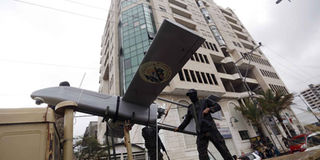Banning drones by African states bad for the continent

Palestinian members of Al-Qassam Brigades, the armed wing of the Hamas movement, display a drone during a military parade marking the 27th anniversary of the Islamist movement's creation on December 14, 2014 in Gaza City. While some can fly to a speed of up to 60 kilometres per hour, their flight range isn’t much, courtesy of limited battery power output, a variable for improvement. PHOTO | MOHAMMED ABED |
What you need to know:
- While some can fly to a speed of up to 60 kilometres per hour, their flight range isn’t much, courtesy of limited battery power output, a variable for improvement.
- Recently the BBC reported a helicopter-type drone flew at 700 feet off the ground as an Airbus A320 was landing at Heathrow airport. Any moving 10 kg object colliding with an air borne plane means danger.
- This would require, first, laws and regulations, non-existent in African countries, for drones use, not banning a la Kenya, South Africa and Tanzania. What’s the fear? Any new technology comes with risks to be managed.
There’s an aviation technology that’s advancing rapidly but instead of embracing it, the best some African countries are doing is ban the gadgets it’s producing.
They’re formally known as Remotely Piloted Aircraft Systems or Unmanned Aircraft Vehicles. Discussion here isn’t about those that fire missiles, go to the outer space or drone in the sky gathering intelligence for all types of reasons.
It’s about small contraptions that can be carried in the boots of most family cars.
In developed countries, the United States leading, they are getting better and proliferating as prices go down.
These aircrafts are available in hobby shops and through the internet. While some can fly to a speed of up to 60 kilometres per hour, their flight range isn’t much, courtesy of limited battery power output, a variable for improvement.
ICY GLARES
Television companies use them to hover over scenes; hobbyists fly them for fun, sight seers to document spectacular natural features, US police departments for surveillance, ad infinitum.
Concerns over their use exist. Hence, legislators, where the use of drones is prevalent, are busy formulating mandatory regulations to replace voluntary guidelines aviation authorities issue.
Reasons exist. Recently the BBC reported a helicopter-type drone flew at 700 feet off the ground as an Airbus A320 was landing at Heathrow airport. Any moving 10 kg object colliding with an air borne plane means danger.
On a campaign trail late last year, German Chancellor Angela Merkel reportedly had a bewildered smile as an object crashed a few feet from her and dignitaries. Her defence minister reportedly had an icy glare.
Understandably! The drone, flown by a protest group, could have carried an explosive device.
The BBC reported in October a University of Birmingham Police Commission report in the UK warned drones could be used by terror groups to attack public events. Merkel episode illustrates.
The report also acknowledged possible “significance benefits” to UK’s security and economy.
The police use of drones illustrates possible security benefits.
LAWS AND REGULATIONS
As for economic, it doesn’t make sense to use an automobile to collect or deliver a single 3 kg parcel a drone can at less the cost of the fuel. Equipped with GPS, these contraptions can hover from backyard to backyard, village to village.
In the current issue of The Atlantic magazine, Andreas Raptomoulos, founder of Matternet, a California-based company working on drones’ transportation, talks of a model he says is appropriate for developing countries, including in Africa. In fact, the company has carried out trials in Lesotho.
“We think about it not just as a point-to-point delivery, but as a Network,” he says. Other than delivering medicine where roads are deplorable, what else? Well, there are borders to patrol, poachers to apprehend, and ethnic clashes to monitor, ad infinitum.
A network a la Raptomoulos’ might be too ambitious. As of now, though, drop-and-pick anything light, be it medicine or surveillance material, is possible.
This would require, first, laws and regulations, non-existent in African countries, for drones use, not banning a la Kenya, South Africa and Tanzania. What’s the fear? Any new technology comes with risks to be managed.




